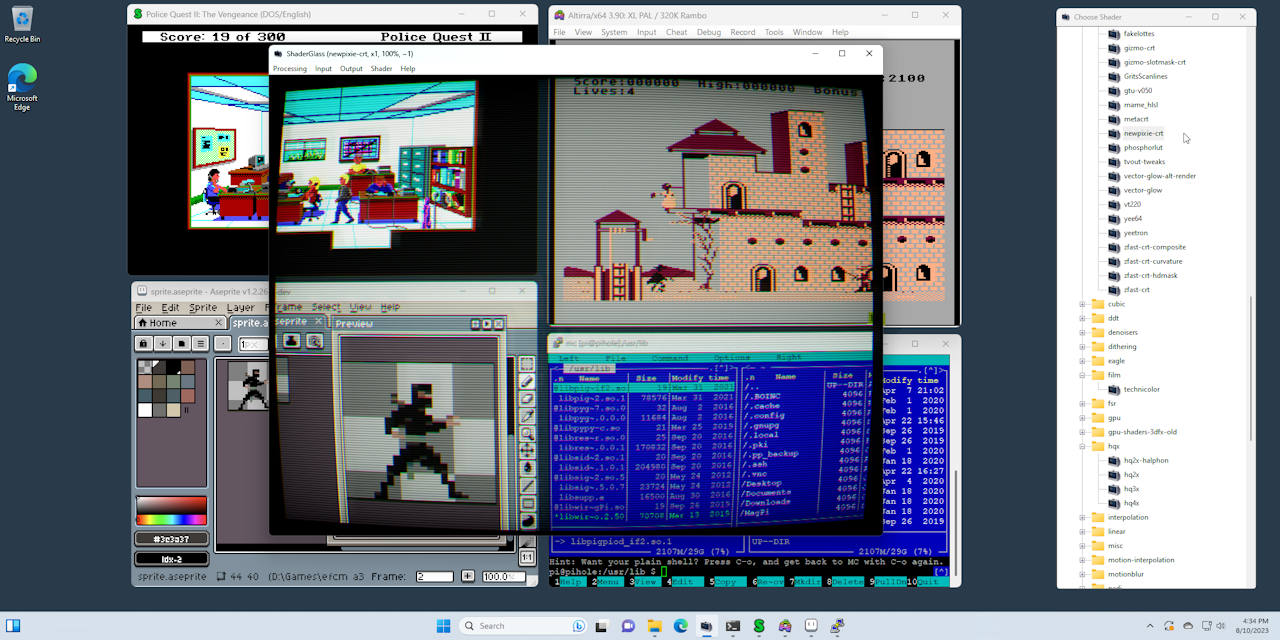



Overlay for running GPU shaders on top of the Windows desktop.
- Applies shader effects to the top of the desktop, in a floating window or full-screen
- Built-in RetroArch shader library (1200+ shaders!) covering:
- CRT monitor simulation
- image upgrade
- TV, VHS and handheld simulation
- Soften, defocus, blur, sharpen and more
- Works with most emulators, retro platforms and pixel art editors including:
- Excellent companion for pixel art showing shaded and/or aspect-ratio modified previews
- You can also use it on YouTube, Twitch or on top of modern games
- Allows capture from USB source (webcam or capture card)
- Saving and loading profiles
- Importing external .slangp/.slang shaders
- High adaptability with various options, operating modes and shader parameters
- Can be captured by OBS (using game capture source)
See online manual for details.
Latest stable release (v1.2.x, 29 August 2025):
- Device capture input (webcam/capture card)
- Hide original mouse cursor when “Capture Cursor” is enabled
- Global hotkeys + ability to edit more of them
- Sonkun presets added
- (1.2.1) Improved device capture performance and improvements
- (1.2.2) Fix for blanking browser video when inactive
https://github.com/mausimus/ShaderGlass/releases/download/v1.2.2/ShaderGlass-1.2.2-win-x64.zip


Join us for testing BFI (Black Frame Insertion) and Blur Busters’ CRT beam simulator shaders here.
Beta and earlier versions are available here
- Windows 10, version 2004 (construction 19041) or windows 11
- Will work on version 1903 but in limited capacity (no desktop glass mode)
- Windows 11 allows this remove yellow border (See the FAQ for tips on avoiding this on Windows 10)
- DirectX 11-capable GPU
Click to watch on YouTube
ShaderGlass is running on multiple applications on Windows 11 desktop.

In this mode a transparent floating window will apply a shader to anything behind it. Requires Windows 10 2004 – on 1903/1909 you will only see a black window if you switch to this mode.
Wikipedia in Chrome Processed by crt-geom shader which applies scanlines and CRT curvature.

When the capture is fixed to a specific window it is easy to tune the scaling to match the input and the image can also be re-captured (screenshot/OBS etc.)
Amiga version of The Secret of Monkey Island (1990) running in FS-UAE with a CRT-interlaced-halation shader.

Ninja (1986) for the Atari XL running in Alterra with a TV-out simulation shader.

The Crimson Diamond (2024), a modern AGS game using the HSM MegaBezel STD shader.

Police Quest (1987) with its huge half-EGA pixels, aspect-ratio corrected and post-processed using a NewPixie-CRT shader.

Rick Dangerous (1989) with C64 monitor shader.

See the online manual for option explanations and FAQs.
Built using Visual Studio 2022 using ISO C++20, Windows SDK 10.0.26100, Windows Capture API and DirectX 11.
ShaderGlass includes a limited implementation of the RetroArch shader back-end using DirectX 11. ShaderGen is a command-line tool for converting Slang shaders into .h files that can be precompiled into ShaderGlass. The conversion process depends on:
- glslang for converting Slang/GLSL shaders to SPIR-V
- SPIR-V cross-compiler to convert them to HLSL (DX11 format)
- Direct3D shader compiler (fxc.exe) for pre-compilation to bytecode.
-
The ShaderGlass application is provided under the GNU General Public License v3.0
-
It contains pre-compiled shaders from the Libretro/RetroArch shader repository. Please see the copyright notes within the shader code for detailed copyright and license information about each shader.
-
App icons courtesy of Icons-Land
-
A huge congratulations to the RetroArch team, the emulator developers, and the wider Retro community!
-
Thanks to @lonestarr and @EndlesslyFlowering for the PR and everyone for feedback and testing 👍


